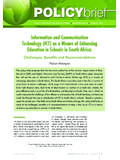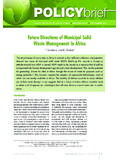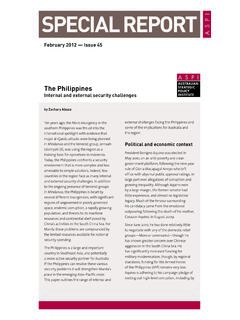Transcription of The Role of Political Parties at the Local Government Level
1 1 Africa Institute of South Africa AISA POLICY brief Number 26 June 2010 BRIEFING NR 2 APRIL 2008 GBRIEFING NO 26 JUNE 2010 The ongoing review of decentralisation in South Africa will defi nitely affect Political Parties legitimisation mechanisms at the Local Level . For this reason, one may expect the same actors, together with civil society organisations (CSOs), to be actively involved in the policy process of review. Their apparent low involvement in this process is taken as this policy brief s starting point, which is aimed at focusing on the role of Political Parties in Local The article also uses references in the case of Ghana to highlight the main challenges for Local governments in South Africa, and suggests critical perspectives for further the time of writing this policy brief, South Africa is undergoing a reshaping of the Political arena, which seems a necessary and healthy proc-ess considering the African National Congress (ANC) legitimisation crisis.
2 2 The process of consultation on the reform of decentralisation is a chance for all citizens to participate in the shaping of the Level of govern-ment that most infl uences their everyday life. It is a crucial moment for Local politics and governance to act and show its effectiveness, in particular for opposition Parties to play their role of fostering representation and participation in such a relevant day the ANC legitimisation is indeed be-ing played at the Local Level . Decentralisation is ul-timately for the Government not only the channel to address inequalities and redistribute resources, but also the main instrument to show its capacity of conveying the voices of all South Africans and answer their different interesting aspect to be noted is that South Africa is the only case in Africa where op-position Parties happen to control some of the Local governments. This aspect of the process em-bodies undeniable opportunities and challenges At the time of writing, Lara Natalini was a Research Fellow at the Africa Institute of South Role of Political Parties at the Local Government LevelA Refl ection on South Africa at the time of the Policy Process of Review on DecentralisationLara Natalini2 AISA POLICY brief Number 26 June 2010 Africa Institute of South Africafor representation and participation at the Local Level , especially for marginal groups.
3 However, it is a popular opinion that opposition Political par-ties representatives at the Local Level do not have any contact with the electorate, and are not con-cerned about and involved in what goes on at the the basis of such considerations, and in order to highlight the challenges that the process of decentralisation is facing in the country, it is useful to consider also another African decentrali-sation model, that of Ghana, which signifi cantly differs from South Africa in one of the core char-acteristics outlined. As a matter of fact, Local elec-tions in Ghana are held on a non-partisan basis. The case of Ghana will be used here to refl ect on the meaning of having or not having a partisan lo-cal arena, and the way it can affect representation and participation, the Level of Local governments autonomy from the centre, and service delivery Democratic decentralisation is defi ned as a process which involves the transfer of powers to democratically elected Local authorities with fi s-cal autonomy.
4 Fiscal decentralisation refers to the transfer of fi nancial resources and powers to raise levies from the centre to Local governments, together with the recognition of autonomy on lo-cal governments budget decisions. However, the impact of deconcentration, which entails the transfer of workload from the central Government head offi ces to regional branches having limited discretion, will also be , by democratic Local governance one refers to a Local system where representative ac-tors interact within the broader framework of the country s Political system to manage the public affairs of a Local community being accountable to , that of the decentralised state, as the model of the state itself, is not an indigenous one. For this reason there is need for a synthesis with the existing Local governance dynamics that were already working on the ground before the intro-duction of the decentralised and ParticipationThe pre-existence of a Local governance systemIn both Ghana and South Africa, when observing Local governance dynamics, one will discover the presence of overlapping identities.
5 7 One of the main related problems is the often troubled inter-action between traditional leaders and Local gov-ernments in rural areas, which affects the imple-mentation of development projects. For example, the chiefs are the only authority who can talk to the grassroots and mobilise them, or there is often the need for the chief s authorisation to utilise a particular land. 8 Moreover, as far as South Africa is concerned, Government has to acknowledge the strengths of churches and witchcraft, which strongly affect people s everyday (1999, 131) points out the relevance of par-allel structures of power put in place by Ghanaian governments to work on the ground with District Assemblies. The author refers to Rawlings revo-lutionary committees, which populated the Local arena in the 1980s to create consent around and involvement in the new revolutionary the contrary, what happens in South Africa is that there has always been a high Level of grass-roots politicisation because of the ANC mobilisa-tion activities spread out during the last century, and because of the liberation struggle developmental role of Local governmentsIn both countries, Local governments have been given a developmental role.
6 11 Local governments are indeed thought to be able to convey the voices of the grassroots and answer their , in Ghana, the bottom-up planning process, supposed to begin at the Unit Committee Level , has never really Since they are not paid, Unit Committees are not even always elected and in place. What happens is that, since Unit Committees cannot convey people s voices, District Assemblies end up working on a poverty reduction agenda, which is drafted by the Government in the country s Poverty Reduction Strategy Papers (PRSPs).13 Ultimately, the paradox is that District Assemblies are asked to work on an agenda which is that of the Government , not the one of the , in South Africa, the relatively par-ticipative municipalities Integrated Development Plans (IDPs) are not, as one would expect, in-forming the district and metropolitan IDPs of the grassroots priorities.
7 On the contrary, they are ultimately supposed to articulate the mecha-nisms and instruments to implement national Moreover, it is interesting to note that, together with a shift from the Reconstruction and Development Programme (RDP) to the Growth, Employment and Redistribution Programme (GEAR) at the national Level , municipalities per-ception of their economic development role seems 3 Africa Institute of South Africa AISA POLICY brief Number 26 June 2010to vary from seeing it as pro-poor, pro-growth, or a mixture of the the basis of these considerations one may advance the hypothesis that the focus on the de-velopmental role is meant to underline that Local governments in both cases are not conceived as spaces for Political confrontation among different development agendas, but as mere instruments to implement development policies shaped at the na-tional Level .
8 Developmental seems to ultimately mean non- Political . Mechanisms for representation and participation at the Local levelAs far as representation and participation are concerned, it is useful to warn about the misuse of the concept of community in the development environment; a word which is usually given many defi The homogenous and harmonic com-munities one may like to theorise about probably do not exist; what Local governments deal with is groups of individuals which may have very differ-ent ideas and expectations, while sharing common problems to be solved or interests to both the considered cases, the weaknesses of the non-paid Ghanaian Unit Committees and South African Ward Committees, together with that of the methods for community information and participation, hinder the ownership of develop-ment initiatives. Local governments are supposed to hold regular meetings with their electorate, and people are expected to participate in various fo-rums organised, for example, for budget approval or development planning purposes.
9 However, es-pecially in remote rural areas, there is a huge lack of information and the majority of the people do not even understand what consultation processes are , the different and confl icting legitimi-sations within Local councils often cause confl icts which undermine the development process. The various actors that populate District Assemblies and Municipal Councils, chosen and/or appointed in different ways, act as different confl icting elites. For example, it is common for Assembly Members and Ward Councilors to end up fi ghting for the al-location of resources to their respective addition, one of the main challenges affect-ing both countries is the lack of a clear defi nition of the role of traditional authorities at the Local Level . Chiefs are appointed to Local governments not only to deal with traditional matters, but also because of their recognised ability to mobilise people and their unique role in create Ghana, by law two thirds of the Assemblies members are elected on a non-partisan basis, while a third is appointed.
10 17 The rationale for the choice of the Rawlings regime in the 1980s was that communities would have been more committed to working together for development had they not been divided on a partisan basis. The appointees are needed to ensure the presence of skilled person-nel, considering that the non-partisan based elec-tions may drive voters to elect illiterate candidates they trust more than others. However, appointees are usually chiefs, who are also not supposed to be party affi liate in order to avoid divisions among their communities. Moreover, the main fi gure at the Local Level , the District Chief Executive, is ap-pointed by the Government . The appointment is needed to facilitate the Government s control of developmental policies at the Local Level . 18 Finally, the non-partisan Local Political system is thought to facilitate women s participation and involve-ment in politics.












